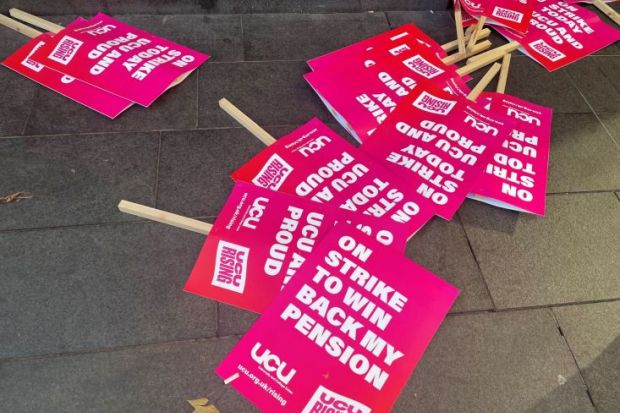As a member of University and College Union’s Higher Education Committee (HEC), I am disappointed that the latest UK-wide ballot hasn’t met the 50 per cent turnout threshold legally required for industrial action. But I am not surprised.
I know from speaking to my fellow members that there is little appetite for more industrial action between now and the new year, following the hardships of the marking and assessment boycott (MAB). And I am not disappointed in them. Their decision whether to abstain or participate is a democratic one. When we ballot, we should always remember that we are asking members a question, not issuing a command. As HEC, we have to accept that this is the view of the membership at this moment and consider how we respond.
So, while we celebrate what has been won, we should also be self-critical about our failings as a union. Yes, we have won an important, historic victory on the Universities Superannuation Scheme (USS), and no one should deny the scale of what has been achieved. We have also managed to secure a marginally improved pay offer, although we are some way from being paid what we genuinely deserve. Where we have stalled, however, is in our attempts to address excessive workloads and in improving the working conditions of our most vulnerable members. And that isn’t because our members didn’t care enough. It is because of employer intransigence, yes, but it is also the result of strategic choices that we have made around when and how to take industrial action.
The news about the reballot arrived just as the starter pistol was fired in the race to elect a general secretary for the next five years. UCU Left announced on 25 October that they’ll be fielding Socialist Workers Party member Saira Weiner as their candidate. A few days later, UCU Left also announced that former UCU president Vicky Blake would be standing and encouraged their members to vote for her too. At the time of writing, Blake herself hasn’t announced her candidacy, nor made any comment on Weiner's endorsment.
If an electoral pact was to come about between Blake and Weiner, I suspect that it would be is less ideological than strategic. It would represent the culmination of a bitter, years-long campaign to unseat the current general secretary, Jo Grady. Twice in 2022, and once again this year, delegates at UCU’s congress and sector conferences have tried and failed to pass motions of no confidence in Grady, and – though the charge sheet has varied each time – the underlying message is the same. Some within UCU dislike Grady because she has proved to be more independent and difficult to control than they had anticipated.
I am an independent member of HEC, not a member of UCU Commons and not an active supporter of Grady’s first campaign for general secretary. I share some of the same gripes about her that many members have. I dislike the way in which social media has become UCU’s new public square, and I cringe at the tone of how we communicate on Twitter. I hate seeing us pander to the far-left Morning Star and despair that our main parliamentary allies seem to be the old warhorses of Corbynism.
Yet I also realise that these things are largely superficial. What I have come to conclude is that Grady has been a remarkably effective general secretary considering the circumstances of her tenure. She cannot take sole credit for what we have won, but she and her staff have demonstrated their ability to marshal the crucial support that members need to deliver big wins like the USS settlement, as well as improved pay offers in further education. Equally, while Grady can’t claim credit for all that has been won, it is fundamentally unfair to blame her for all that has gone wrong for UCU.
The union has doubtless made mistakes over the past year or so, but many of us seem desperately unwilling to reflect upon our own roles in setting the union’s strategy. UCU’s democratic structures are horribly opaque and Grady’s visibility make her a natural target for discontent. But the fact is that the key decisions taken during the past 18 months or so have been taken by HEC, and among them there have been some serious blunders.
My own view – one that I expressed back in March – is that the union should have accepted the offer of the Universities and Colleges Employers Association (Ucea) for extended talks on the non-pay issues. This was the course of action proposed by the general secretary and current UCU president Justine Mercer, who had negotiated the offer. HEC rejected Grady’s proposal and instead recommended that members reject the offer, leading us into the hugely demanding, and ultimately unsuccessful, marking and assessment boycott over the summer.
A unified anti-Grady campaign will point to many of her failings, which is understandable in any election – we are voting to hold our elected representatives to account. But as the campaign progresses, I hope that the same level of scrutiny will be directed at all the candidates and that members have a clear understanding of the key role played by members of HEC – including Blake and Weiner – in getting us to where we are today.
Dyfrig Jones is a senior lecturer in film at Bangor University and branch president of Bangor UCU.
Register to continue
Why register?
- Registration is free and only takes a moment
- Once registered, you can read 3 articles a month
- Sign up for our newsletter
Subscribe
Or subscribe for unlimited access to:
- Unlimited access to news, views, insights & reviews
- Digital editions
- Digital access to THE’s university and college rankings analysis
Already registered or a current subscriber? Login






